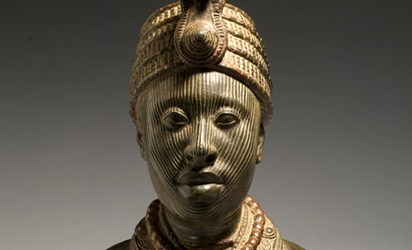In the ancient city of Ile-Ife, Osun State, Nigeria, where history and legend intertwine like the roots of the mighty Iroko tree, was Queen Lúwo Gbàgìdá, a woman of unwavering spirit and undeniable grace.
Queen Lúwo Gbàgìdá was the first and only female to ascend to the esteemed position of the 21st Ooni of Ife. A symbol of empowerment in a world steeped in tradition, her journey to the throne, her reign, and her enduring legacy are nothing short of extraordinary.
Queen Lúwo Gbàgìdá’s story didn’t begin in the grandeur of a palace but in the humble setting of a small village in Osun State, Nigeria. Born as Olufunmilayo Ademilua, she imbibed the values of hard work, resilience, and community from her family of strong-willed individuals.
Legend has it that she married Chief Ọbalọran of Ilode and became the mother of Adekola Telu, the founder of Iwo town. Their union defied societal norms, ultimately leading to her historic coronation as Queen Lúwo Gbàgìdá, the first female Ooni in the history of the ancient city. In some records, she is referred to as Lúwo Gbàgìdá, a descendant of Otaataa from Owode compound, Okerewe.
Her ascent to the throne faced mixed reactions, as traditionalists questioned its legitimacy, challenging centuries-old customs. Nevertheless, she remained resolute in her mission to rewrite the narrative for women, not only in Ife but worldwide.
Historical accounts describe her as a woman of remarkable beauty who took great pride in her appearance. While history may not have always acknowledged women on the prestigious throne of Ife due to oral traditions, she broke this precedent.
Following the passing of Ooni Giesi, she became the first and only female Ooni, known for her love of beauty and her commitment to maintaining a well-groomed and serene environment. She commissioned the creation of unique pavements (now owned by the Ife Museum) and open-air courtyards paved with pottery fragments, adorning not only Ife but other Yoruba towns she visited.
These paved streets served dual purposes: they beautified the surroundings and punished lawbreakers. Offenders were tasked with baking clay, breaking it into pieces, and laying it on the ground for the queen to walk on.
Her reign was marked by a strict sense of discipline. She was a formidable presence, especially to the men of Ife. She had no tolerance for laziness or those who broke her laws. All members of the community, regardless of social status, were treated equally under her rule. The elders saw her as “uncontrollable” and “high-handed.”
Consequently, after her reign, the council of Obas vowed never to allow a woman to become the Ooni of Ife again. Despite these challenges, Queen Lúwo Gbàgìdá played a significant role in assisting her son Adekola Tolu in establishing the city of Iwo, making him the first Oluwo of Iwo.
Her reign was characterized by a delicate balance between tradition and progress. She celebrated Ife’s cultural richness while championing gender equality and women’s rights. Her dedication to inclusivity extended beyond gender to bridge the gap between Ife and the wider Nigerian society.
During her rule, Ife blossomed into a center for cultural exchange, attracting people from diverse backgrounds to experience its beauty and history. Festivals, exhibitions, and symposiums flourished, showcasing Ife’s cultural heritage and fostering unity among diverse communities. Queen Lúwo Gbàgìdá’s legacy continues to inspire and pave the way for gender equality and cultural appreciation in Nigeria and beyond.
236
previous post


